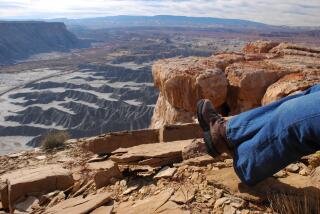Critics Call Utah Land Swap Unfair
- Share via
WASHINGTON — The Bush administration recently agreed to a massive land swap with Utah even though the federal government’s experts had warned that the deal amounted to a $100-million giveaway by U.S. taxpayers, documents show.
The deal would exchange 135,000 acres of federal land for 108,000 acres of state parcels, many of them surrounded by federal areas. Utah would get commercially attractive land that would pump taxes into its school system. The federal government would get scenic red-rock bluffs for a possible national monument as well as prime habitat for the threatened desert tortoise.
At least six officials at the federal Bureau of Land Management, including its chief real estate appraisers for Utah and the nation, have complained internally that the swap offers a windfall to the state. They said several parcels of mineral-rich federal land had been counted as having little or no mineral value, and they issued blistering critiques of “one-sided and inaccurate” information in an official white paper justifying the deal.
BLM negotiators and their bosses in the Interior Department valued the state and federal lands at about $35 million for each side. But the BLM’s Utah office concluded that the federal land’s worth ranged from $97 million to $117 million more. One of Utah’s top officials bragged that the oil, gas, coal, tar sands and oil shale deposits his state would obtain through the deal “could bring in hundreds of millions of dollars.”
“This is like Enron all over again,” said Kent Wilkinson, a BLM appraiser in Utah who gave documents and e-mail messages to the Washington Post. “They’re cooking the books, and it’s all to the detriment of the public.”
This is the third controversial state-federal land swap in Utah in four years. An audit last year by the Interior Department accused the BLM of approving a lopsided deal with private Utah landowners. Environmental groups have sharply criticized the agency’s deal, while Western conservatives complained throughout the Clinton administration about federal efforts to lock up land as monuments and wilderness.
On Friday, Wilkinson and lawyers with the group Public Employees for Environmental Responsibility filed a complaint, which could hold up the latest trade.
Tom Fulton, a deputy assistant secretary of the Interior, said Friday that the department will reconsider one slice of the deal as a result of BLM’s concerns, reevaluating a coal-rich 4,000-acre tract that was inaccurately designated as mineral-free. But he defended the exchange as mutually beneficial, giving the federal government more manageable land, the state more commercially attractive land.
More to Read
Sign up for Essential California
The most important California stories and recommendations in your inbox every morning.
You may occasionally receive promotional content from the Los Angeles Times.













